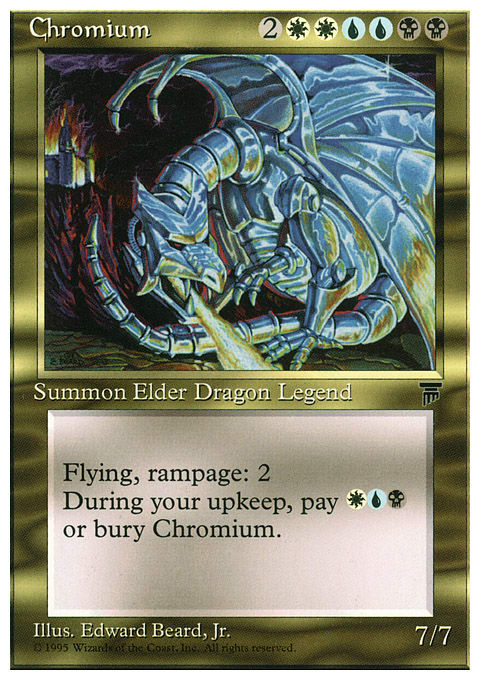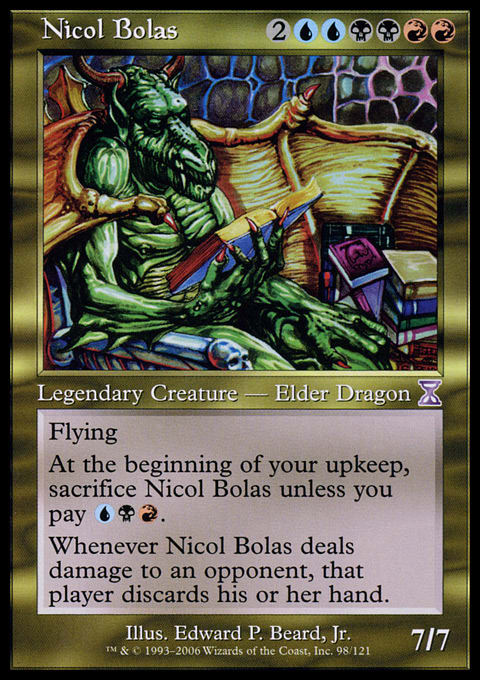Commander Prehistory
Elder Dragon Highlander first appeared in Alaska, probably inspired by a 1996 Duelist article “Elder Dragon Legend Wars” by Jesus Lopez. It started as a goofy casual format between friends, with only the original five Elder Dragons as generals and a variable life total depending on the number of players.
Sheldon Menery, often referred to as the godfather of EDH, was responsible for bringing the format into the public eye. It started out with a few local playgroups, became a fixture on the Pro Tour judge circuit, and eventually was published in an article on StarCityGames.
In 2005, Gavin Duggan suggested a website and forum for the official rules, and the format began to take hold. A Rules Committee was formed to manage the format, starting out as a small group of judges and eventually inviting some online community members and other Magic professionals. If you’re interested in the full cast and story, Sheldon wrote about it here.
My History of Commander
I played Magic on and off throughout grade school, but college was where I really got into the game. I was much more interested in casual than tournament Magic, and I started worrying less about winning and more about shaping experiences. One of my first pieces of Magic writing was Five Rules for Building Fun Magic Decks (later posted here).
It was around 2008 during this period when I first encountered Elder Dragon Highlander and fell instantly in love. It gave me the variance and replayability that sixty-and-four casual games had been lacking, and it let me play the giant monsters and epic spells that were too slow for other formats. It wasn’t long before I had four decks built and played more EDH than any other form of Magic.
In 2009, Elder Dragon Highlander made some huge strides forward. The RC was working more closely with Wizards of the Coast, even adding DCI Tournament Manager Scott Larabee to the committee. Planechase introduced the command zone to Magic, and the EDH rules took the opportunity to make some massive changes. The Partial Paris was adopted as the official mulligan, generals lost their immunity to the legend rule, and league rules for calling dibs on generals were phased out.
This was my first experience of major change within the format and the first time I became aware of the RC as the folks making the decisions. At some point, I even sent Gavin Duggan an e-mail suggesting they use the creation of the command zone to phase out tuck effects (effects that put a general into its owner's library).
I decided to join the official EDH forums, and I made sure my first post would generate some good discussion. It didn't take long for me to develop a reputation on the forum for making reasonable and polite arguments. Ban Ki-Moon (now publicly revealed as RC member Alex Kenny) and I had some particularly excellent discussions, as we disagreed on many issues but respected each other and enjoyed a similar style of analytical debate.
Then came the biggest upheaval in EDH yet: On December 2, 2010, the Commander preconstruted decks were announced, and with them was a host of changes. Elder Dragon Highlander was officially renamed Commander, Magic Online was synchronized with the real-world format, and color identity was introduced to make the internal rules more logical and consistent. Or, as the official MTGCommander.net changelog puts it, “December 2nd, 2010: The world ended. Planets fell from the sky. The seas rose up in anger.”
I was embroiled in the Great Designer Search 2 at that point, and I couldn't have been more excited. Not only was I competing for my dream job at Wizards, they were becoming involved with my favorite format! It seemed perfect.
By the time the Commander decks came out that summer, I had been eliminated in the final round of the GDS2 and was back to pursuing my dreams on other axes. But I stayed heavily involved with Commander, playing constantly with friends and discussing it online. Eventually, my opinion began to carry some weight online. I’d occasionally receive e-mails or forum private messages from members of the Rules Committee asking my opinion on possible bannings or rules changes.
This spring, I was waiting for a video editing project to render, and I tuned in to an episode of CommanderCast featuring Gavin and Alex. Listening to them talk about their love for the format and how much they appreciated the opportunity to contribute to it was the first time I thought, “Wow, I'd really like to be on the Rules Committee someday.”
I continued to exchange occasional messages and e-mails with Committee members, but now I had a goal in mind. When Sheldon asked if I could make it to Pro Tour: Return to Ravnica in Seattle to meet with them, I had high hopes.
I met Sheldon at the Pro Tour, and he grabbed fellow RC members Toby Elliot and Scott Larabee for a short meeting in the back room. They asked why I thought I was there, and I answered honestly that I hoped they were considering me for the Rules Committee. They confirmed that this was the case and that they were meeting me to, in Sheldon's words, “get the measure of the man” and “make sure I wasn't a drooling idiot.”
We discussed why I wanted to be a part of the RC and what opinions and experiences I brought to the table. At the end of the meeting, they unanimously agreed to offer me a formal invitation to the Rules Committee. I accepted.
My only disappointment from the weekend was that I didn’t get a chance to actually play Commander with them. Here's the deck I plan to field when I get the chance to face some fellow RC members:
"Devon Rule's Oros Equipment"
- Commander (1)
- 1 Oros, the Avenger
- Creatures (21)
- 1 Kor Duelist
- 1 Serra Ascendant
- 1 Stoneforge Mystic
- 1 Puresteel Paladin
- 1 Grand Abolisher
- 1 Knight of the White Orchid
- 1 Bloodghast
- 1 Reassembling Skeleton
- 1 Boros Swiftblade
- 1 Mirran Crusader
- 1 Skyhunter Skirmisher
- 1 Phyrexian Crusader
- 1 Pilgrim's Eye
- 1 Kor Cartographer
- 1 Solemn Simulacrum
- 1 Taj-Nar Swordsmith
- 1 Graveborn Muse
- 1 Sanctum Gargoyle
- 1 Stonehewer Giant
- 1 Sun Titan
- 1 Godo, Bandit Warlord
- Equipment (14)
- 1 Sunforger
- 1 Sword of Fire and Ice
- 1 Sword of Feast and Famine
- 1 Sword of Light and Shadow
- 1 Sword of Body and Mind
- 1 Sword of War and Peace
- 1 Batterskull
- 1 Swiftfoot Boots
- 1 Loxodon Warhammer
- 1 Quietus Spike
- 1 Basilisk Collar
- 1 Skullclamp
- 1 Fireshrieker
- 1 Umezawa's Jitte
- Instants (15)
- 1 Condemn
- 1 Swords to Plowshares
- 1 Wing Shards
- 1 Terminate
- 1 Unmake
- 1 Wrecking Ball
- 1 Mortify
- 1 Return to Dust
- 1 Orim's Thunder
- 1 Wild Ricochet
- 1 Ghostway
- 1 Dawn Charm
- 1 Hide // Seek
- 1 Tithe
- 1 Enlightened Tutor
- Sorceries (6)
- 1 Austere Command
- 1 Hallowed Burial
- 1 Demonic Tutor
- 1 Steelshaper's Gift
- 1 Remember the Fallen
- 1 Beacon of Unrest
- Artifacts and Enchantments (8)
- 1 Land Tax
- 1 Bitterblossom
- 1 Phyrexian Arena
- 1 Sol Ring
- 1 Darksteel Ingot
- 1 Wayfarer's Bauble
- 1 Expedition Map
- 1 Armillary Sphere
- Lands (35)
- 1 Inkmoth Nexus
- 1 Lavaclaw Reaches
- 1 Mistveil Plains
- 1 Sunhome, Fortress of the Legion
- 1 Kor Haven
- 1 Buried Ruin
- 1 Orzhov Basilica
- 1 Boros Garrison
- 1 Rakdos Carnarium
- 1 Marsh Flats
- 1 Arid Mesa
- 1 Bloodstained Mire
- 1 Sacred Foundry
- 1 Blood Crypt
- 1 Godless Shrine
- 1 Rugged Prairie
- 1 Fetid Heath
- 1 Graven Cairns
- 7 Plains
- 5 Swamp
- 5 Mountain
I love this deck because it has a sort of tempo-aggression that really punishes opponents who want to sit back and do nothing. It's got a low curve with only a small handful of cards at 5-6 mana, and a ton of aggressive weenies to equip with Swords. In the mid to late game you've got a powerful Sunforger package, several Skullclamp engines, and the voltron-potential to one-shot opponents with infect or general damage. It's a deck where you have to build your own haymakers, and really rewards tight play.
Wrapping Up
I hope you've enjoyed my meandering exploration of Commander's history and my experience with it. Next week, I'll be talking about some of the boogeymen that plague Commander and my opinions on how best to address them.




























